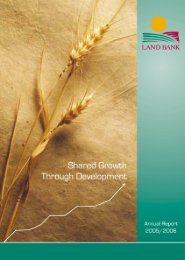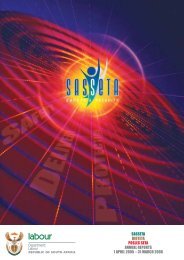Human Settlements Review - Parliamentary Monitoring Group
Human Settlements Review - Parliamentary Monitoring Group
Human Settlements Review - Parliamentary Monitoring Group
You also want an ePaper? Increase the reach of your titles
YUMPU automatically turns print PDFs into web optimized ePapers that Google loves.
<strong>Human</strong> <strong>Settlements</strong> <strong>Review</strong>, Volume 1, Number 1, 2010<br />
the world as different objects operating as<br />
part of a large machine. Thus the mechanistic<br />
worldview was born. Isaac Newton also<br />
held this mechanistic worldview and these<br />
two people became synonymous with the<br />
mechanistic worldview (Capra, 1975).<br />
This view did not only examine oneself<br />
mechanistically, but also nature and society<br />
were viewed mechanistically or as separate<br />
parts. Separate parts to be exploited by<br />
different interest groups, which has lead to<br />
various environmental and social crises over<br />
the years. There have been positive aspects<br />
to this mechanistic worldview, both classical<br />
physics and technology developed from this<br />
worldview, although they have often lead to<br />
detrimental conditions (Capra, 1975).<br />
It should be remembered that a patriarchal<br />
worldview also dominated societies’ views on<br />
life from that time to modern times. Around<br />
that time, a man named Francis Bacon<br />
who formulated a clear theory for making<br />
experiments and he became famous for this.<br />
He also viciously attacked nature through<br />
phrases containing metaphors referring to<br />
nature as women and that one should enslave<br />
and torture nature in order to learn, use and<br />
abuse. This image of nature was concurrent<br />
with witch trials, which were held frequently<br />
in his time. The effect of Bacon’s attack<br />
was that the view of the nurturing earth was<br />
disappearing to be replaced with the view of<br />
the earth as a machine coupled with patriarchal<br />
views of society (Capra, 1983; Capra, 1988).<br />
Metaphors promoting the domination of nature<br />
prevailed under the mechanistic worldview, at<br />
the same time women were put under male<br />
domination through a paternalistic worldview.<br />
This illustrates the effects of metaphors on<br />
society’s conceptual thought system.<br />
The mechanistic worldview has lead to a<br />
technological revolution in an attempt to put<br />
nature under greater domination and to make<br />
use of nature in a more efficient manner.<br />
This need for technology advancement and<br />
domination over nature shows symptoms<br />
of being ideological, with technology and<br />
economic advancement being elevated to<br />
hyper-normative status with disregard to the<br />
other normative values’ true natures. This is<br />
coupled with a relationship of domination with<br />
technology dominating nature (Schuurman,<br />
1983).<br />
7. Change of Worldview and<br />
the New Paradigm<br />
Solutions to the problems associated with<br />
the paternalistic and mechanistic worldview<br />
need to be formulated and a good first step<br />
is to change the dominating worldviews to<br />
metaphors that do not promote degradation<br />
and fragmented views of what is true nature.<br />
A new worldview has been formulated on<br />
the old worldview that existed before the<br />
mechanistic worldview. It focuses on a holistic<br />
view of nature and life, and follows what is<br />
known as systems thinking or a systems<br />
view of life. It looks at life in its entirety and<br />
includes the interrelationships and the<br />
interdependencies that make up life. For while<br />
mechanistic science studied the basic building<br />
blocks, systems science focuses on the basic<br />
principle of organization (Capra, 1983).<br />
149



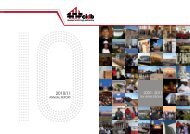
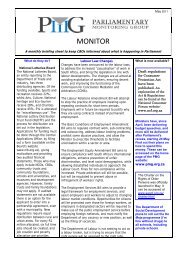
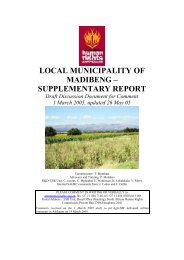
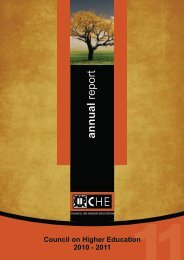
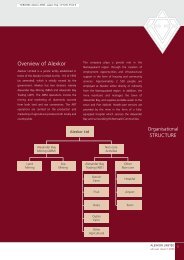
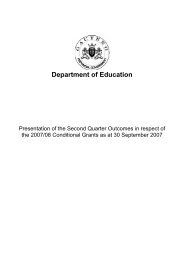
![National Research Foundation Annual Report 2008 / 2009 [Part 2]](https://img.yumpu.com/49774036/1/177x260/national-research-foundation-annual-report-2008-2009-part-2.jpg?quality=85)

